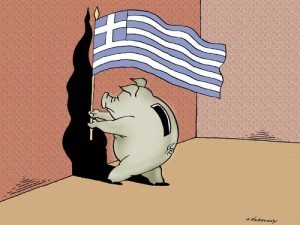By
There is definitive proof, for anyone willing to look, that Greece is not solely or even primarily responsible for its own financial crisis. The proof is not especially exciting: It is a single bond, with the identification code GR0133004177. But a consideration of this bond should end, permanently, any discussion of Greece’s crisis as a moral failing on the part of the Greeks.
GR0133004177 is the technical name for a bond the Greek government sold on Nov. 10, 2009, in a public auction. Every business day, governments and companies hold auctions like this; it is how they borrow money. Bond auctions, though, are not at all like the auctions we’re used to seeing in movies, with the fast talkers and the loud hammers. They happen silently, electronically. Investors all over the world type a number on their keyboards and submit it as their bid: the amount of interest they would insist on receiving in exchange for the loan. Just as with mortgages and credit cards, the riskier a loan is, the higher the rate would need to be, compensating the lender for the chance that the borrower in question will fail to pay it back.
We think of stocks as the paradigmatic investment, but bonds are the single most important force in the financial world, determining which companies and economies rise and which collapse. A bond is a form of i.o.u.; when a government or a company issues one, it is actually borrowing money with a precisely defined promise to pay it back after a specified period of time at a set interest rate. Every bond has the same basic criteria: duration, yield and risk. This means that bonds can be easily compared and traded. The typical bond may be resold dozens of times over its lifetime, for a discount or a premium on its issuing price, based on how the market feels the prospects for that issuer have changed. The current price of old bonds is updated constantly, providing a real-time scorecard for the relative riskiness of those issuing bonds, from the government of Kazakhstan to Citibank to your local hospital.
Forget the global fight against terrorism or the Internet and globalization: When historians come to write of our age, the time we are living through now, they may well call it the age of bonds. This age began in 1944, near the end of World War II, when sober men in suits gathered in Bretton Woods, N.H., to prevent future wars. What they wound up creating was the basic architecture of a new global financial system, in which rational economic calculus, not military and political power or ancient prejudices, would determine where money flows.
For decades, this was a much better world. Federal bonds funded the growth of an American highway infrastructure and created a truly national economy; municipal bonds brought the South out of its agrarian doldrums. In Europe, the impact was even greater. European bonds allowed money to flow freely across borders, knitting disparate states that had warred for millenniums into one unified economy. More prosaically, bonds provided objective rigor to the funding of private companies’ activities, helping to break up a cozy, WASPy boys’ club that had determined which enterprises got to borrow money.
On that day in 2009 when GR0133004177 was issued, investors had every reason to assume that this was an especially risky loan. The Greek government wanted 7 billion euros, or $10.5 billion, which would not be paid back in full until 2026. These were all sophisticated investors, who were expected to think very carefully about the number they typed, because that number had to reflect their belief in the Greek government’s ability to continually pay its debts for the next 17 years. I was shocked, looking back, to see the winning number: 5.3 percent. That is a very low interest rate, only a couple of percentage points above the rate at which Germany, Europe’s most creditworthy nation, was borrowing money. This was a rate that expressed a near certainty that Greece would never miss a payment.
In hindsight, of course, we know that the investors should not have lent Greece anything at all, or, if they did, should have demanded something like 100 percent interest. But this is not a case of retrospective genius. At the time, investors had all the information they needed to make a smarter decision. Greece, then as now, was a small, poor, largely agrarian economy, with a spotty track record for adhering to globally recognized financial controls. Just three weeks earlier, a newly elected Greek prime minister revealed that the previous government had scrupulously hidden billions of dollars in debt from the rest of the world. In fact, the new leader revealed, Greece owed considerably more money than the size of its entire annual economy. Within a month of the bond sale, faced with essentially the same information the investors had, Moody’s and the other ratings agencies downgraded the country’s credit rating. In less than six months, Greece was negotiating a bailout package from the International Monetary Fund.
The original sin of the Greek crisis did not happen in Athens. It happened on those computer terminals, in Frankfurt and London and Shanghai and New York. Yes, the Greeks took the money. But if I offered you €7 billion at 5.3 percent interest, you would probably take the money, too. I would be the one who looked nuts. And if I didn’t even own that money — if I was just watching over it for someone else, as most large investors do — I might even go to jail.
Today, the global bond market is twice the size of the stock market. And while bonds barely move in price compared with stocks, bonds’ slight twitches give far more important information. A slight increase in a bond’s interest rate can serve as a warning that investors no longer trust a company or a government quite so much; a drop in rates can be a reward for hard work accomplished, allowing an institution to raise future funds at a lower long-term cost. But a world of bonds works only when the investors who buy the bonds are extremely nervous and wildly cautious. Bonds, that is, are designed to be safe and boring investments, bought by extremely conservative institutions, like pension funds, insurance companies and central banks. When they are bought by (or on behalf of) private investors, they are supposed to represent the more stable portion of the overall mix. The very nature of stock markets inclines them to collapse every decade or so, and when they do, it can be painful. But a stock-market collapse is not debilitating. If the world bond market were to collapse, our way of life would be over.
On Sept. 17, 2008, in the late afternoon, this almost happened. For a few dramatic days, prominent economists and other financial experts — serious, unemotional people who had never before said anything shocking in their lives — talked privately, if not publicly, about the real possibility of the end of the United States, the end of electricity and industry and democracy. When the bailout money flowed to save the banks, that was just the fastest way to accomplish the real goal: to save the bond market.
And in that moment, the essential nature of the bond market shifted. Previously, the stability of bonds was reinforced by the cautiousness of people who owned and managed them, and vice versa. But the bailout broke this virtuous circle, signaling that the bond market would stay safe even when bond buyers were wildly reckless, pouring billions of dollars, for example, into risky subprime-mortgage bonds. The bailout represented a transfer of wealth from the rest of the economy into the bond market — precisely the opposite of what is supposed to happen. Now, in the moral hand-wringing over Greece and its failure to pay, we see that bondholders expect to be bailed out constantly, even when they were obviously culpable in failing to manage their own risk. The various European Union plans for Greece involve what is essentially a transfer of wealth from poor Greek people to wealthy German bondholding institutions.
The institutions that bought that €7 billion in Greek debt in 2009 made a very bad judgment. Even at the time, it was clearly a foolish gamble — so foolish, in fact, that it can be explained in only one way. They believed that in the event of default, the Germans would bail the Greeks out. And just to be clear: This doesn’t mean they believed that the Germans would be kind to the Greeks. It means they believed that the Germans would be kind to the people who owned Greek bonds, a significant percentage of whom were certain to be German themselves. In lending money to Greece at 5.3 percent interest, they weren’t calculating Greece’s ability to pay. They were calculating the German government’s willingness to help out German banks.
To be fair, the people who owned GR0133004177 did see its value fall by nearly half in 2012, when the Greek government negotiated its second bailout package with the European Union and the I.M.F. But by most estimates, those bondholders should have lost far more, even the full amount of their investment. Instead, the bailout effectively transferred billions of euros from Greek citizens to unwise bond investors.
There is an unsentimental logic to markets. If you make a bad investment, you are supposed to pay the full price — because if you don’t pay the full price, you will keep making bad investments. The only way to get the bond market back to its historic role is to make bondholders feel real fear that they might lose money if they make bad decisions. We need the market to reward bets that are economically wise, instead of those that are politically savvy.
Adam Davidson is a contributing writer for the magazine and a founder of NPR’s “Planet Money.”



















